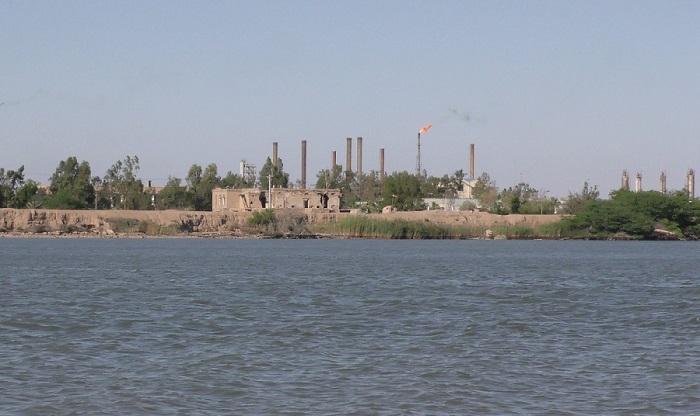Iraq and Iran signed a deal to strengthen border security between the two neighboring countries over the weekend. The agreement is an effort to tighten security near Iraq’s Kurdish region, as Iran says armed Kurdish dissidents are posing a threat to its security.
Iranian Supreme National Security Council secretary Ali Shamkhani signed a border security deal with Iraqi National Security Adviser Qasim Al-Araji on Sunday, with Iraqi Prime Minister Mohammed Shia al-Sudani overseeing the deal, according to the Iraqi prime minister’s office. The joint deal includes coordination in “protecting the common borders between the two countries and consolidating cooperation in several security fields.”
“Under the signed security deal, Iraq pledges it would not allow armed groups to use its territory in the Iraqi Kurdish region to launch any border-crossing attacks on neighbor Iran,” according to an Iraqi security official who attended the event.
The region was placed in the spotlight in 2022 when the Iranian Revolutionary Guards launched missile and drone attacks against the Iranian Kurdish groups that are based in northern Iraq. The groups were accused of fomenting the widespread protests in Iran that followed after the death of Kurdish Iranian Mahsa Amini in the custody of the morality police after she was arrested for allegedly flouting the Islamic dress code.
“Shamkhani’s current trip to Iraq has been planned since four months and is focused on issues related to the armed groups in northern Iraq,” said Iranian foreign minister Hossein Amirabdollahian.
Tehran has also accused Kurdish militants of working with its adversary Israel and has often alleged that there is the presence of Israeli intelligence agency Mossad in the Kurdish region of Iraq.
Meanwhile, Iranian President Ebrahim Raisi also received an invitation from Saudi King Salman to visit Riyadh following the deal that saw the reconciliation of the two countries, according to an Iranian official. Iran and Saudi Arabia announced last week a China-brokered deal to restore ties after cutting off relations seven years ago in 2016. Saudi Arabia severed relations with Iran after Iranian protesters attacked Saudi’s diplomatic mission after the Saudi execution of Shia cleric Nimr al-Nimr.
The deal expects to have Iran and Saudi Arabia reopen their embassies and missions to each other’s countries in two months and implement security and cooperation deals that were signed over 20 years ago.



 TrumpRx Website Launches to Offer Discounted Prescription Drugs for Cash-Paying Americans
TrumpRx Website Launches to Offer Discounted Prescription Drugs for Cash-Paying Americans  New York Legalizes Medical Aid in Dying for Terminally Ill Patients
New York Legalizes Medical Aid in Dying for Terminally Ill Patients  U.S. to Begin Paying UN Dues as Financial Crisis Spurs Push for Reforms
U.S. to Begin Paying UN Dues as Financial Crisis Spurs Push for Reforms  U.S. Lawmakers to Review Unredacted Jeffrey Epstein DOJ Files Starting Monday
U.S. Lawmakers to Review Unredacted Jeffrey Epstein DOJ Files Starting Monday  Iran–U.S. Nuclear Talks in Oman Face Major Hurdles Amid Rising Regional Tensions
Iran–U.S. Nuclear Talks in Oman Face Major Hurdles Amid Rising Regional Tensions  Missouri Judge Dismisses Lawsuit Challenging Starbucks’ Diversity and Inclusion Policies
Missouri Judge Dismisses Lawsuit Challenging Starbucks’ Diversity and Inclusion Policies  U.S. Sanctions on Russia Could Expand as Ukraine Peace Talks Continue, Says Treasury Secretary Bessent
U.S. Sanctions on Russia Could Expand as Ukraine Peace Talks Continue, Says Treasury Secretary Bessent  Trump Says “Very Good Talks” Underway on Russia-Ukraine War as Peace Efforts Continue
Trump Says “Very Good Talks” Underway on Russia-Ukraine War as Peace Efforts Continue  U.S. Announces Additional $6 Million in Humanitarian Aid to Cuba Amid Oil Sanctions and Fuel Shortages
U.S. Announces Additional $6 Million in Humanitarian Aid to Cuba Amid Oil Sanctions and Fuel Shortages  Ukraine-Russia Talks Yield Major POW Swap as U.S. Pushes for Path to Peace
Ukraine-Russia Talks Yield Major POW Swap as U.S. Pushes for Path to Peace  Nighttime Shelling Causes Serious Damage in Russia’s Belgorod Region Near Ukraine Border
Nighttime Shelling Causes Serious Damage in Russia’s Belgorod Region Near Ukraine Border  China Warns US Arms Sales to Taiwan Could Disrupt Trump’s Planned Visit
China Warns US Arms Sales to Taiwan Could Disrupt Trump’s Planned Visit  Trump Allegedly Sought Airport, Penn Station Renaming in Exchange for Hudson River Tunnel Funding
Trump Allegedly Sought Airport, Penn Station Renaming in Exchange for Hudson River Tunnel Funding  Trump Lifts 25% Tariff on Indian Goods in Strategic U.S.–India Trade and Energy Deal
Trump Lifts 25% Tariff on Indian Goods in Strategic U.S.–India Trade and Energy Deal  South Korea Assures U.S. on Trade Deal Commitments Amid Tariff Concerns
South Korea Assures U.S. on Trade Deal Commitments Amid Tariff Concerns  TrumpRx.gov Highlights GLP-1 Drug Discounts but Offers Limited Savings for Most Americans
TrumpRx.gov Highlights GLP-1 Drug Discounts but Offers Limited Savings for Most Americans  Ohio Man Indicted for Alleged Threat Against Vice President JD Vance, Faces Additional Federal Charges
Ohio Man Indicted for Alleged Threat Against Vice President JD Vance, Faces Additional Federal Charges 





























